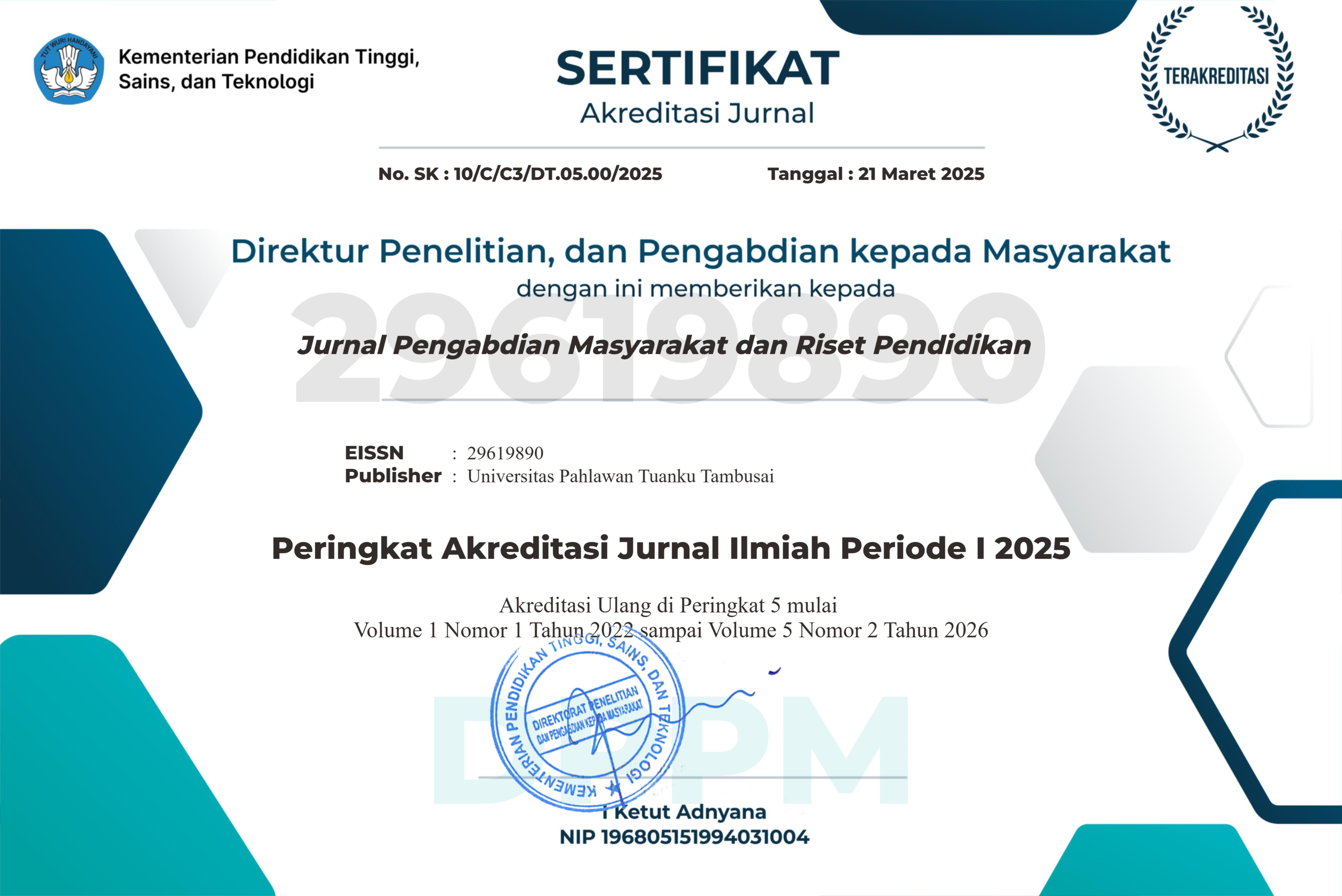Penerapan Strategi Pembelajaran Peningkatan Kemampuan Berpikir (SPPKB) Peserta Didik untuk Meningkatkan Hasil Belajar Matematika pada Materi Trigonometri di Kelas X-1 SMA Negeri 1 Hibala TP.2022/2023
DOI:
https://doi.org/10.31004/jerkin.v2i3.258Keywords:
Think, Mathematics Learning Outcomes.Abstract
The aim of this research is to determine the improvement in mathematics learning outcomes in Trigonometry material through the application of learning strategies to improve thinking skills (SPPKB) for students in Class X of SMA Negeri 1 Hibala. This research was conducted in Class X of SMA Negeri 1 Hibala, with a collaborative class action research design. This classroom action research is carried out in the form of an iterative cycle in which there are four main stages of activity, namely planning, action, observation and reflection, and so on until the expected improvements or improvements are achieved. Based on the results of the research that has been carried out, it can be concluded that the application of learning strategies to improve students' thinking skills (SPPKB) can improve the mathematics learning outcomes of students in Class X of SMA Negeri 1 Hibala. Improved student learning outcomes can be seen from the test results at the end of each meeting. The results of this research prove that there is an increase in student learning outcomes as follows. In cycle I, meeting-1, there was an increase, namely from the average score before the action of 65.37, in other words, the percentage of students' learning completeness was 37.50% to 70.12 or the percentage of students' learning completeness was 40.50%; then at meeting 2 it increased to 75.25 or the percentage of students' learning completeness was 67.50%. In cycle II, meeting-1, there was still an increase from the average value of cycle I, meeting-2, namely from 75.25 to 77.00 or the percentage of students' learning completeness, which was 75%, then at meeting-2 the average value of the class increased to 81.12, in other words, the percentage of students' mathematics learning completeness is 82.50%.
References
Abdurrahman, Mulyono. Pendidikan Bagi Anak Berkesulitan Belajar, Jakarta: Rineka Cipta, 2009.
Cece Wijaya. 2010. Pendidikan Remedial: Sarana Pengembangan Mutu Sumber Daya Manusia. Bandung: PT Remaja Rosdakarya
Huda.(2014). Model-Model Pengajarandan Pembelajaran.271.
Jensen, Eric. 2011. Pemelajaran Berbasis-Otak. Paradigma Pengajaran Baru. Jakarta: PT Indeks
Kasmina:Toali.(2013). Matematika untuk SMK/MAKKelasXI.Jakarta:Erlangga.
M,H.(2014).Pendekatan Saintifik dan Kontekstual dalam Pembelajaran Abad 21. Bogor: Ghalia Indonesia.
Model-Model Pengajaran dan Pembelajaran.(2014).Yogyakarta: Pustaka Pelajar.
Model-Model Pengajaran dan Pembelajaran. (2014).2/1.
Muslich, Masnur. Melaksanakan PTK Itu Mudah, Jakarta: Bumi Aksara, 2011.
Purwanto, Ngalim. Psikologi Pendidikan, Bandung: PT Remaja Rosdakarya, 2000.
Syah, Muhibbin. Psikologi Belajar, Jakarta: PT Raja Grafindo Persada, 2003.
Sanjaya, Wina. Penelitian Tindakan Kelas, Bandung : Kencana, 2010
Sanjaya, Wina. 2016. Penelitian Tindakan Kelas. Jakarta. Prenada Media.
Sugiyanto, Model-Model Pembelajaran Inovatif, (Surakarta:Yuma Pustaka Bekerja Sama dengan FKIP UNS, 2010), h.159-160
Sugiyono.(2010).Metode Penelitian Tindakan Kelas. Bandung: Alfabeta
Suherman, Erman. Strategi Pembelajaran Matematika Kontemporer, Bandung: JICA-UPI, 2001.
Sukmadinata, Nana Syaodih. Landasan Psikologi Proses Pendidikan, Bandung: Remaja Rosdakarya, 2004.
Syah, Muhibbin. Psikologi Belajar, Jakarta: PT Raja Grafindo Persada, 2003.
Wijanarko, Y. (2017). Model Pembelajaran Make A Match untuk Pembelajaran IPA yang Menyenangkan. Jurnal Taman Cendekia. Volume 1 (1): 53
Downloads
Published
How to Cite
Issue
Section
License
Copyright (c) 2024 Titus Bago

This work is licensed under a Creative Commons Attribution-ShareAlike 4.0 International License.















